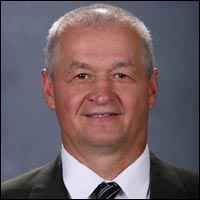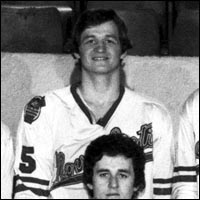by Danielle Catalano || AHL On The Beat Archive
 |
| Mike Busniuk’s record as an AHL assistant coach stands at 537-496-110 in 14-plus seasons (through Dec. 3). |
The 2008-09 American Hockey League season marks the 36th year that Binghamton, N.Y., has been home to professional ice hockey.
For 10 of those years, Mike Busniuk has helped write the sport’s history there as an assistant coach, first with the former Binghamton Rangers from 1993-97 and since 2003, with the Binghamton Senators.
“I think Buzzie has signed more contracts with Binghamton’s clubs than any player who’s passed through here,” quips Tom Mitchell, vice president of business operations for the Binghamton Senators, who has worked with Busniuk throughout most of the Thunder Bay, Ont., native’s 17-year coaching career. “He genuinely likes this community, and this town likes him right back.”
While friends, colleagues, players and fans refer to the assistant coach as “Buzzie”, the former defenseman calls himself a “booster-fan-club type of guy” who exudes what long-time Binghamton season-ticket holder Hans Petersen describes as “a fan’s personality, on and off the ice.”
“I don’t know where I get it from,” shrugs Busniuk. “I just have an upbeat attitude and like to be positive. When a player gets upset about his performance, I try to remind him that yes, this is his job, but it’s supposed to be one of the best experiences in his life — plus he gets his summers off. Enjoy it. The time to worry is after hockey, when you have to work at a job during the summer.
“That’s why I became a teacher and a coach, you know. I like my summers off.”
A VOYAGEUR BEGINS HIS JOURNEY
Busniuk was the Montreal Canadiens’ fifth-round pick (67th overall) in the 1971 National Hockey League amateur draft. He spent three years attending the University of Denver, earning a degree in education before turning pro in 1974 and playing forward with the Nova Scotia Voyageurs, then Montreal’s AHL affiliate.
Busniuk signed with the Beauce Jaros of the North American Hockey League the following season and switched his role to defense, the position he would play until retirement nine years later. Montreal re-signed Busniuk in 1976, and with Nova Scotia, he won his first two Calder Cups.
In 1977, fate stepped in to prepare Busniuk for his second career in hockey. The defenseman signed with the Philadelphia Flyers organization and become a teammate of two future Binghamton hockey head coaches: Al Hill and John Paddock. The three would win two Calder Cup championships together while skating with the Maine Mariners. In addition, they suited up for the parent club during parts of the 1979-80 hockey season, helping the Flyers to the Stanley Cup Finals.
After winning the 1984 Calder Cup in Maine, the trio parted ways professionally, with Hill moving onto the Hershey Bears, Paddock remaining behind the Mariners bench and Busniuk returning to Thunder Bay with his family. For the next six years Busniuk taught math, science and French immersion classes at the high school level, and also served as a guidance counselor.
Throughout this period, however, he actively sought coaching jobs, and in 1991, Busniuk’s efforts were rewarded when he was named head coach of the Tri-City Americans of the Western Hockey League.
Life in the major juniors lasted one season.
“You know the sports curse about buying a house?” laughs Busniuk. “Well, my wife (Jan) and I were in the midst of signing the paperwork when Al called. Why we didn’t try to buy a house in 1985, I don’t know.”
THE FIRST FOUR YEARS
“Al and I are friends,” Busniuk explains, “and he knew that I had been looking for a coaching position all those years. So when he was promoted [as the Binghamton Rangers] head coach in ‘93, he contacted me to be his assistant. We played well together earning those championships, and he wanted that same level of success in Binghamton.”
It took a year, but the former teammates’ coaching chemistry steered the 1994-95 squad to the league’s best record and its first of two Southern Division titles.
“With the Rangers, we had two very successful years and two not-so-successful years,” Busniuk says. “Our ’94-’95 and ’95-‘96 teams had a good core of players who had vision, and the fans feed off that vision.”
Hans Petersen confirms the city’s mood during the Rangers’ divisional championships.
“We had a great time during those years,” he says. “Buzzie was — and is — very professional, but he’s got a fan’s personality, too, and it was really starting to come out then. You’d watch the games and see it spread across the bench. Even today outside the rink he’s like that.”
After a disappointing 1996-97 season, the team relocated to Hartford, Conn., and was renamed the Hartford Wolf Pack. Busniuk remained with the New York Rangers’ affiliate for five more seasons and soon was reunited with John Paddock as the two helped lead the 1999-2000 club to its Calder Cup victory.
Following the 2001-02 season, Busniuk took up the head coach position of the Muskegon Fury of the United Hockey League. Under his tutelage, the Fury won 36 games and played its first post-season contest in three years before losing in the second round.
 |
| "Buzzie" is one of four men in AHL history to win five Calder Cup championships as a player. |
BACK TO BINGO
Shortly after the loss, second-year Binghamton Senators head coach John Paddock called Busniuk to see if his close friend would like to serve as his assistant. Busniuk hardly needed convincing. While in Muskegon, he henjoyed watching the B-Sens play in Grand Rapids against the Griffins, and the opportunity to return to the Southern Tier was too much of a temptation.
"In Binghamton, fans are so knowledgeable,” Busniuk says. “When I was with the Wolf Pack and would go into the store and talk to people, they would ask what I did for a living. I would say I was an assistant coach with the Wolf Pack. The person would just look at me and ask, ‘Is that a new basketball team in town?’…
“With Binghamton,” he continues, “[when] I say that I am an assistant coach with the Senators, they don’t ask me what the team is. They start asking me questions about how we’re going to play against such-and-such team. They know their team and they like to talk about the team. That’s part of the reason why when John called and offered me the assistant coaching job, we took it. My wife and I like the area, like the people. It made the decision to return easier."
In his first year with the club, the B-Sens advanced to the qualifying round of the postseason, ending with a 2-0 loss to the Norfolk Admirals.
“Even though the year ended in a thud, we were all happy Buzzie was back,” Mitchell says. “When the Rangers left, this town’s heart was ripped apart. To have that piece of sentiment back meant so much.”
The NHL locked out its season the following year, and some of today’s Ottawa Senators were assigned to play in Binghamton, including Jason Spezza, Anton Volchenkov, Antoine Vermette, Chris Neil, Chris Kelly and Christoph Schubert. For Busniuk, that season rendered one of his fondest memories in Binghamton thus far and is a testament to one of the organization’s biggest rivalries.
“In our first games in [the ’05 playoffs], when we had everyone down from Ottawa, we played against Wilkes-Barre,” he says, grinning. “When we won those two games, you’d swear we just won the Stanley Cup. This place was so loud. The fans were crazy — even during the game. You’d scream to players, and they still couldn’t hear you. Mind you, we loss the next four games against Wilkes-Barre — but that doesn’t matter. We beat the Penguins first.”
BUZZIE BEING BUZZIE
Jumping ahead four years, the B-Sens are nearing the quarter mark of the 2008-09 hockey season and finds itself neck-and-neck with its East Division foe. As the club battles up the standings and beyond, the preparation is bringing out as much the teacher in Busniuk as the former defender.
“With the amount of injuries we’ve had to overcome and having guys called up this early on in the season, we sometimes put more pressure on ourselves to make up for the losses,” says Busniuk. “The guys start overanalyzing, crushing their sticks, making mental mistakes like that. So, in practice we work on making chances happen, getting the opportunity to go our way. Breaking it down, clearing the mind, getting rid of the negativity. If you make the chances happen, eventually something goes right.”
During instances like these, Mitchell views Busniuk’s professional and personal attributes as a boon for the organization’s future successes — especially as the club looks to return to the playoffs after a three-year absence.
“At this league level, business is more fun. There’s more pressure to win, but it’s more fun,” he says.
Little problems can fester and become big problems, but Buzzie’s personality is outgoing, and his background draws players’ empathies. He brings those important elements to the locker room, and the players and coach trust him because of that.
“When it comes to the booster club and our fans,” continues Mitchell, “Binghamton is a hockey town, and Buzzie’s from a hockey community. He knows what being part of that environment is like and he communicates those feelings well, so when he says he’s a ‘booster-fan-club type of guy’, he really is. He’s always talking to people, getting them excited Binghamton hockey. That’s just who he is.”





































